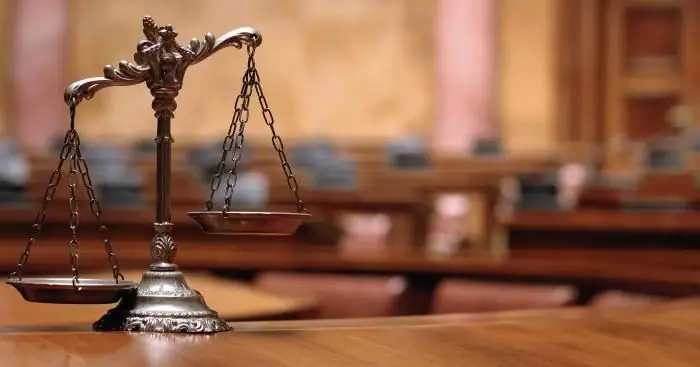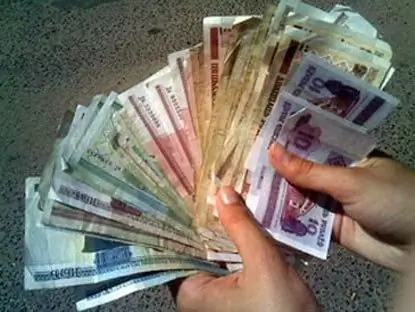2026 Author: Howard Calhoun | calhoun@techconfronts.com. Last modified: 2025-01-24 13:10:41
The economy affects all spheres of human life, therefore it is necessary to know its terms and processes. The reason for this is the presence of money in the wallet and the need to use it as a payment instrument. Moreover, such concepts as devaluation, inflation and default are more often found in news reports. They mean different processes that negatively affect the economic development of the state. Of course, this also affects personal well-being. And what exactly takes money from the wallet and leads to a decrease in their purchasing power should be de alt with in more detail.

Devaluation
When understanding what devaluation and default are, you should immediately pay attention to the fundamental difference between processes. Read about it below. Devaluation is an economic process of reducing the value of the exchange rate of a monetary unit against another currency or a decrease in the gold share in providing national money. This is an unplanned downturn in the economy, which leads to the inability to maintain the exchange rate at the same level.
In the narrow sensedevaluation - this is a decrease in the value of money, which implies a subsidence of the exchange rate. For example, the exchange rate of currency "A" to currency "B" was 1 to 1. Then, after the recession in the economic development of the country in which currency "A" is used, its monetary unit became cheaper relative to currency "B". In fact, it has fallen in price against all other currencies of the world. This interpretation allows us to reveal the concept of "devaluation" in simple terms.

Default
Default is the refusal of an economic entity to fulfill previously taken credit or other debt obligations. It arises from a recession in the economy or from devaluation, high inflation, or failed economic reforms. This means that the subject, namely the state, economic bloc, company or individual, cannot repay the loan due to the lack of funds available for this. By declaring a default, the entity admits its insolvency, although it guaranteed a return when receiving a loan.
Default itself cannot occur if assets were pledged upon receipt of a loan. Then they are simply withdrawn and become the property of the creditor, and the debts of the borrower are written off. However, when there are no funds to repay the loan, it declares its own insolvency. Strictly speaking, the economic entity is bankrupt. After that, you have to consider scenarios that decide what will happen in the event of a default with the economy. Read more about it below.

Devaluation and default ineconomy
So, what is devaluation and default? The term devaluation is considered from two positions: from the point of view of the previously existing "gold standard" and the current free (market) currency regulation. If we consider that the exchange rate of the monetary unit is regulated by the volume of gold and foreign exchange reserves, then devaluation is a process of reducing the gold and foreign exchange share in the financial support of money stability. Such an example is relevant for the Chinese yuan, whose exchange rate is not freely regulated, but controlled by the People's Bank of China. Gold and foreign exchange security is also relevant for many other states.
The exchange rate of the currency of other states is in free market "floating". This means that the demand for a currency unit determines its price. This forms the exchange rate, that is, the value of the money of one state in the currency of another. Under such conditions, devaluation means depreciation of one currency against all others.

Default, in contrast to the devaluation process, is a more destructive phenomenon. It means that there are no funds to be repaid on loans. The subject, that is, the company, the state or an individual, must be recognized as a default. This means that he borrowed the amount of assets some time ago, but there is no way to return it at the appointed time. Below, all such processes, which answer questions about what devaluation and default are, are explained in more detail.
Commonness of default and devaluation processes
Having understood what devaluation and default are, we should conclude that these are different processes and terms. Devaluation is only a decrease in the value of the currency, and default is a deep economic crisis, the complete absence of opportunities to return credit funds. In processes such as devaluation and default, the difference is significant also because they can be applied to different subjects. Devaluation applies only to the state, that is, to a subject that has its own monetary system and monetary unit. Default is a concept peculiar to an individual, company or government.
However, in these processes there are some common phenomena, as well as points of contact. The first commonality is the economic crisis: both devaluation and default occur when the economic system fails. The second commonality is the long-term negative consequences for reputation: both of these processes reduce the attractiveness of the monetary unit for investments and for storing capital. Otherwise, these concepts are different.

Unstable economy: paths to devaluation and default
What is the difference between default and devaluation and where do these concepts come into contact? If everything is clear with the differences, then the points of contact can be completely different. They should be disassembled on the basis of typical economic processes of states with underdeveloped economies. For example, there is a state "A" with a weak or unstable economy. In this country, a certain monetary unit is used, which, after the abolition of the "Gold Standard", is provided by gold and foreign exchange reserves. Volumeof this money is equal to the amount of goods released in the state.
Due to the wrong emphasis of the leadership or due to economic or commodity sanctions, the export profit of the state and its enterprises is reduced. Then the enterprises work “for the warehouse” or stop producing altogether. At the same time, foreign exchange inflows decrease, which requires the expenditure of gold and foreign exchange reserves to pay social benefits or unemployment payments. As a result, the volume of gold and foreign exchange reserves is decreasing. This means that the country has fewer reserves to support the exchange rate. Investor confidence in it is declining, and the economy is working inefficiently. Devaluation occurs: depreciation of the monetary unit in relation to other currencies.

Ways out of the crisis
Under such conditions, states decide to obtain loans to invest in the economy. When loans are spent irrationally, that is, for example, they are not invested in stabilizing the economy, but are spent on social payments so as not to cause a decrease in trust in the government, the result is obvious: the economy has not been restructured, but there are still debts, the time comes for the return of credit funds. If the state cannot pay debts on loans received or on government loans, it declares a default. Then the problem is solved at the interstate level in order to find a solution to stimulate the economy so that the borrower returns the funds.
Points of convergence between devaluation and default
From the above example, two conclusions can be drawn:devaluation can be an engine of default. Secondly, the default may become a driver of a new devaluation. That is, the economic crisis that has arisen and the lack of assets to pay off debts provoke a new devaluation. These are the so-called points of contact between these concepts. By the way, they have nothing to do with inflation, which can also become a driver of the economic crisis.
The absurdity of the concept of "ruble default"
Another fallacy is the default of the currency. So, what is the default of the ruble? This is a phenomenon that in reality cannot occur, although in theory it is possible. It will be characterized by such a deep collapse of the ruble currency that it will not be perceived as a means of payment abroad. For the ruble it will not be possible to buy even the minimum monetary unit of another state. That's what the default of the ruble. If you recall Solzhenitsyn's quotes, it will look like this: for our ruble they can only give you a "face".
The impact of devaluation and default on the economy
What is devaluation and default in terms of the impact on the economy and on the balance of payments of economic entities? Devaluation is a process of official (or implicit) agreement that the national currency is worth less than others, and there is either no money to stabilize its exchange rate, or their allocation is irrational. The result is a weakening of the exchange rate of the currency, an increase in the cost of other currencies and, more importantly, a decrease in investor confidence in the country's economy.
Default is also a process that "degrades" the economy in the eyes of investors. Thenthe currency is untenable for savings, because devaluation and default are accompanied by a growing inflation rate. Money is then worth much less than before. This is felt even within the country, especially if it regularly “turned on the printing press” to issue new banknotes. By the way, devaluation has no effect on the domestic economy of the country if it does not depend on imports. And inflation is devastating.

Positive and negative trade effects of devaluation
Devaluation has both positive and negative consequences. Among the positive ones, no doubt, one should point out the decrease in the price of export goods. The state that has carried out the devaluation sells goods to another country with a higher and more stable exchange rate, receiving it in return for products. These funds are tangible profits.
In addition, for foreigners, such products are much cheaper than those bought from countries with well-developed economies. This is a factor in increasing competitiveness in foreign markets. What to do with the devaluation in this case? It's simple: work and sell. Search and diversify sales markets and try to gain a foothold in them. Departure of employees to work abroad also allows you to earn more, although this tactic harms the image of the country and threatens to "outflow of intelligence" abroad.
Negative effects of trade devaluation
The negative effect of the devaluation is a significant increase in the cost of imported goods. What should the state do in case of devaluation? Mostwill competently protect itself from imported goods through import substitution. This path is the most competent and balanced, because it allows you to limit the outflow of the necessary foreign exchange assets from the country's banking system. However, when the state cannot produce some goods, for example, some food products, it still has to buy them. Otherwise, the population is threatened with food deficiency. The third step that the state should not take is to print more money. This move will already hurt the domestic market and stimulate both new devaluation and inflation.
Forecasts for ruble devaluation
In 2015, the ruble was "released" to "free float" and is regulated independently depending on demand. After that, its cross-rate gradually decreases, which is also influenced by political uncertainty. The government plans to start accepting payments for energy carriers exclusively in rubles. And this means only one thing - the course towards the development of a resource-based economy. Fortunately, this is not a default. What's this? In simple words, this is an economic maneuver consisting of several components.
Firstly, the depreciation of the ruble leads to the growth of all other currencies. Russia's assets are now almost 45% made up of dollars. This currency, as you know, is not backed by gold, but is accepted by other countries as a reserve after the rejection of the "Gold Standard". Russian rubles are also in the gold and foreign exchange reserves of other states. Devaluation allows for the existing dollar assets in the state's gold and foreign exchange reserves to purchase most of the ruble assets of the world and return them to Russia.
As a result, oil and gas settlement will require buyers to first buy rubles for their currency and then return them back as payment. The main thing is that the exchange rate of the ruble will be high due to the significant demand for it. This is the long-term forecast, and this is what threatens the devaluation of the ruble in the long term. But in the short term, this can still lead to another default.
What should the population do
Everything that threatens the devaluation of the ruble cannot have a strong impact on the resource-based economy. A formidable consequence is only a default, which is possible with a strong and fairly rapid devaluation. During this period, it is important for the population to refuse to receive loans. Foreign exchange savings will allow you to leave the standard of living as it is now. However, it should be understood that the crisis may drag on for 5 or more years.
In this situation, the most competent tactic is to save your most important assets: real estate and cars. Buying real estate or land in promising areas for construction will significantly increase capital. Otherwise, it is important to live within the available means, for which wages are sufficient. And when a default occurs, the population will also not be affected, unless, of course, it has federal loan bonds in its hands. The difference between a default and a devaluation is that when conditions for a default appear, the state will refuse to repay them. Otherwise, both default and devaluation do not affect the interests of the population, which does not use currency and imported goods, untilinflation accelerates.
Recommended:
The essence of the terms "direct superior" and "immediate superior", the difference between them; performance Manager. What should be the leader

If we compare the concepts of a direct and immediate supervisor, the difference is that there is only one immediate supervisor, but there can be many direct supervisors, that is, this is the closest supervisor by position up from the subordinate on the career ladder
What is the difference between a tour operator and a travel agency: concept, definition, difference, functions and characteristics of the amount of work performed

The words "travel agency", "travel agency", "tour operator" seem similar to some people. In fact, these are different concepts. To understand them and not get confused anymore, we suggest today to study how a tour operator differs from a travel agency and a travel agency. This knowledge will be especially useful for those who are planning a trip in the future
What is the difference between a lawyer and a lawyer, what is the difference? How a lawyer differs from a lawyer - main duties and scope

People often ask such questions: "What is the difference between a lawyer and a lawyer?", "What is the difference between their duties?" When life circumstances arise, when it is necessary to turn to representatives of these professions, you have to figure out who is needed in a particular situation
What is the difference between an apartment and an apartment? The difference between an apartment and an apartment

The residential and commercial real estate market is incredibly vast. When offering housing, re altors often refer to an apartment as an apartment. This term becomes a kind of symbol of success, luxury, independence and we alth. But are these concepts the same - an apartment and an apartment? Even the most superficial glance will determine that these are completely different things. Consider how apartments differ from apartments, how significant these differences are, and why these concepts should be clearly distinguished
Devaluation of the Belarusian ruble in 2015. What is the devaluation of the Belarusian ruble and how does it threaten the population?

The devaluation of the Belarusian ruble in 2015 will have very serious consequences for the population. The crisis can cover not only the real sectors of the economy, but also the banking sector, real estate

